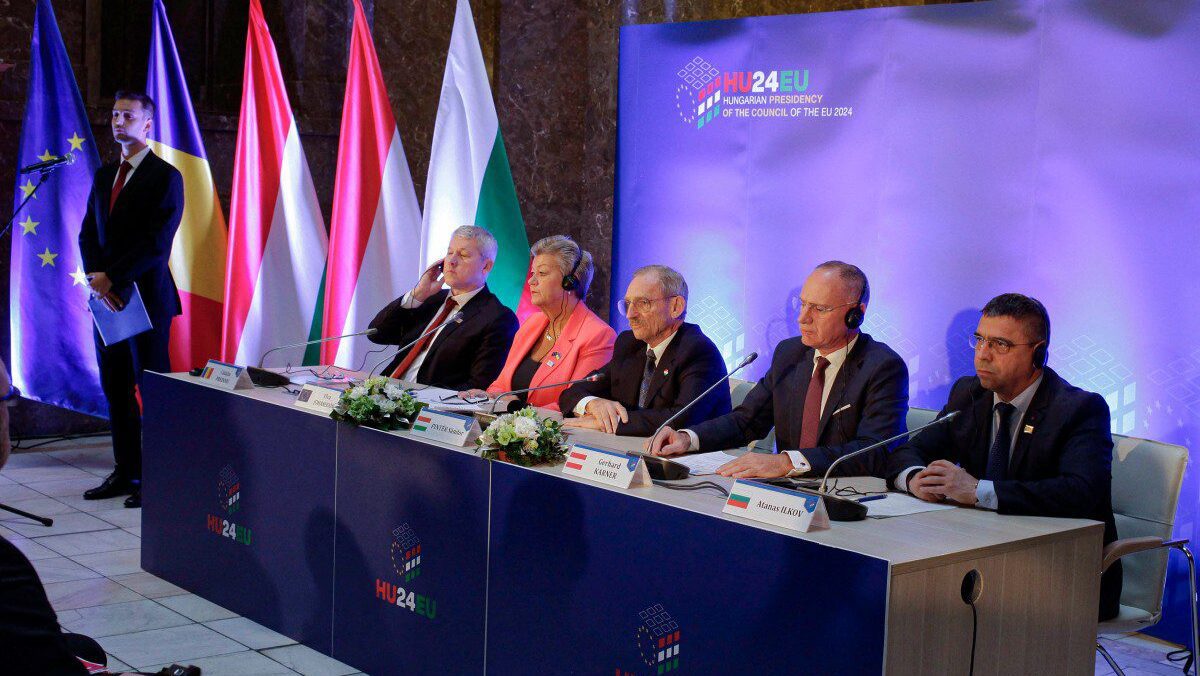
Romania’s Vice Prime Minister and Minister of Internal Affairs Catalin Predoiu, European Commissioner for Home Affairs Ylva Johansson, Hungary’s Minister of Interior Sandor Pinter, Austria’s Federal Minister of the Interior Gerhard Karner and Bulgaria’s Minister of Interior Atanas Ilkov attend a press conference on the expansion of the Schengen area, in Budapest on November 22, 2024.
Photo: Peter Kohalmi / AFP
A deal has been struck for Bulgaria and Romania to become full members of the borderless Schengen Area by January 1st of next year.
The announcement was made on Friday, November 22nd, by Hungary, which holds the rotating six-month EU presidency and has worked to get the accession of the two Central European countries approved by all the other Schengen member states.
🇧🇬🇷🇴 BREAKING! @PM_ViktorOrban: The interior ministers have come to an agreement, and we will put it on the agenda of the December 12 EU summit in Brussels, so that it can come into effect with January 1 and Bulgaria and Romania can finally become full members of the Schengen… pic.twitter.com/xH8ermmOOa
— Zoltan Kovacs (@zoltanspox) November 22, 2024
The final agreement was sealed at a meeting of the interior ministers of Hungary, Bulgaria, Romania, and Austria. The latter had initially opposed the expansion of the Schengen area on the grounds that Bulgaria and Romania needed to do more to prevent illegal immigration.
The two countries were allowed to partially join the free-movement zone earlier this year, as border checkpoints were lifted only for air and sea travel, but not internal land borders. This left Romanian citizens frustrated since over 90% of all border crossings happen on land.
Negotiations with Austria over land entry have continued through 2024, and Hungarian Interior Minister Sándor Pintér said on Friday that “the two countries have made significant steps to gain full membership.”
“We already have an agreed timetable. It will happen from January 1st, 2025. Those who come home for the holidays will leave much easier after,” Romanian Prime Minister Marcel Ciolacu announced earlier this week.
A final decision on the Schengen expansion will be made at a meeting of EU interior ministers on December 12th.
European Commission President Ursula von der Leyen welcomed the news, tweeting: “Let 2025 see Schengen become stronger.”
Bulgaria and Romania belong fully to the Schengen area.
— Ursula von der Leyen (@vonderleyen) November 22, 2024
Removing internal controls at land borders is the last hurdle.
I welcome the positive outcome of informal discussions in Budapest today.
@EUCouncil formal decision is next.
Let 2025 see Schengen become stronger. pic.twitter.com/zHJrg9HzFw
Both Romania and Bulgaria applied for Schengen membership in 2005 and have been waiting for the green light from other EU countries ever since, with mainly Western European states objecting to a lack of appropriate reforms to combat cross-border smuggling and human trafficking. Officials in Bucharest and Sofia won over their Austrian counterparts by pledging to bolster border protection and curb migration. The Netherlands has been hesitant to let Bulgaria in, but the Hague is expected to approve the deal as well.
With the two new entrants, the Schengen Area will have 29 full members, 25 of whom are also EU members.
